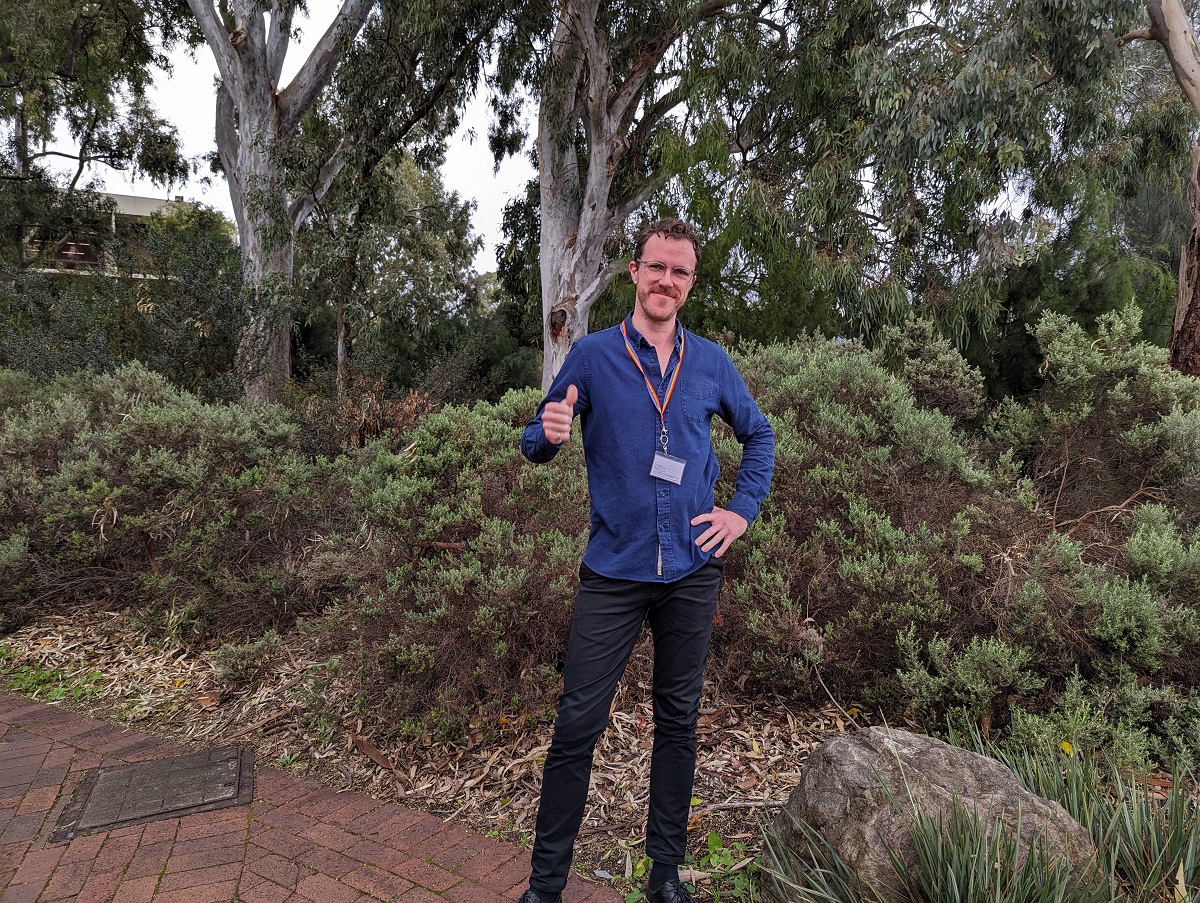
When Luke Wilcox isn’t busy as teaching coordinator of the Bachelor of Nursing, he spends time at the Women and Children’s Hospital as a Clown Doctor. We spoke with him about helping to lift the spirits of sick kids and their families by proving the age-old adage that laughter is the best medicine.
What is your role at Flinders?
My main responsibility is coordinating the teaching of the Bachelor of Nursing. My actual role involves more than this, but with hundreds of academic staff and thousands of nursing students, staffing takes up most of my time. I really enjoy the people-aspect of my role, even though it sometimes feels like herding cats. It’s fun to occasionally run into nursing staff out in the wild, when we’re both on shift at the Women’s and Children Hospital. We are both doing important medical work; their work involves physical care that is heavily based in science, while my work is more about trying to figure out how to get my cat scan to stop meowing, or trying to get feedback from an expert judge on my Australia’s Next Top Model catwalk audition. Apparently, I do a lot of cat-based work. Maybe I need to be a vet instead?
Tell us about your journey to Clowning.
I learn to draw and paint at Adelaide Central School of Art (an amazing art school, just look it up!) and graduated in 2015, but wound up focussing on performance – predominately live and interactive, although I still love drawing. I’ve since been involved to varying degrees in the world of visual art, performance and also do a little theatre work. A friend’s neighbour is a clown doctor and explained that The Humour Foundation (which runs Clown Doctoring nationally) was running auditions, apparently a rare occurrence. I submitted a written application, got myself an audition, then a second and third audition, then managed to snag myself a Clownternship as a result. It was such a surreal, fun process and now I’ve got my dream job. The Clownternship goes for a roughly a year and involves LOTS of training, mentoring and professional development. It’s challenging in all the right ways and I absolutely love it. If everything goes to plan, I will be admitted into the Royal College of Clown Doctors at the end of 2023.
What does it take to be a clown?
This is something I’m still learning about myself. While I’ve had a reasonable amount of experience in performing, the clowning side of things is new to me (despite having been a goofball for my whole life). Although I am definitely not an authority on it, my understanding so far is this: Clowns are curious about the world and their job is to assume the low status in a relationship dynamic, because this elevates the other party. They listen and observe, they are open and constantly searching for connection. Physicality is an important part of the work, as is subversion. Also, to correct a common misconception, we don’t wear makeup. Most clowns don’t. Clown Doctors wear only a red nose on our face. And costumes, including doctors’ coats, on our bodies.
What do you love most about your work?
I love the fact it’s all improvised. There are no ‘routines’ that we perform. It really requires me to be very present in the room so I can connect with the child. We focus on what is right with the child, not what is wrong. It is empowering for the child, who becomes the expert, the director, the hero, the magician. I get to be a professional idiot, which is actually a lot trickier to do well than I initially imagined. And I love working with people and for an organisation that celebrates the values of openness, respect, compassion and silliness as a way to connect and uplift. Laughter really is the best medicine and I feel very lucky.
Who inspires you?
It’s a little cheesy, but my parents provide the easy answer. They are kind, generous and thoughtful humans who I strive to emulate. Generally speaking, visual art inspires me a lot, so there are many artists who I love – and spending time with them or their work gets me excited. In the world of clowning and circus, Olivia Porter is incredible (she co-wrote and produced a show called Party Ghost which I can’t recommend highly enough). Also my Clown Doctor colleagues are a huge inspiration. A few of them have been doing it for more than 18 years and they are still learning. Finally, I have an amazing small group of close friends who are the most lovely, kind, warm, compassionate and generous group. You know the type of person who always makes you feel better about yourself? They inspire me too – and they are exactly the kind of friend I want to be.
What are three words you think people would use to describe you?
If you ask my Flinders colleagues, I like to think they’d say helpful, tall and friendly. If you asked my friends outside of work, they might say kind, generous and a bit of a doofus (which is actually eight words, I know). Or if you asked a giant up a beanstalk, they’d likely say tiny, crunchy, snack. Good luck with that though, because I’m not sure that giant is real, or alive.
How do you like to spend your free time?
My favourite activities revolve around art, cooking, sports and music. I love hanging out with my kids and improving my clowning. I love being around art and talking about ideas. I like listening to music and cooking something that simmers all day and makes the house smell delicious. I like climbing something tall and soaking up a view and I really love having a beer and a yarn at the pub, plus maybe enjoying a boogie or some karaoke.
***
For more information about The Humour Foundation and to lend your support, click here.

